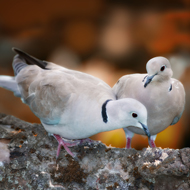The RSPB will be studying while numbers of turtle doves are in decline.
Initiative dedicated to saving threatened bird species
The RSPB has launched a Centre for Conservation Science, dedicated to finding solutions to saving threatened bird species, and celebrating the work of scientists.
The new initiative was unveiled at the RSPB's chief scientists Dr David Gibbons.
The organisation has a team of more than 60 scientists in the UK and overseas, monitoring species, testing conservation ideas, carrying out field research and publishing their findings in peer reviewed journals.
Projects this year include plans to attach cameras and GPS trackers to lesser black backed gulls to look at how they interact with wind farms.
Thermal imaging drones will be used to count birds, while researchers will also look into the reasons why turtle doves, lapwings and Nepal's red headed vultures, are all declining.
Dr Gibbons, head of the RSPB Centre for Conservation Science, said: “These projects are fantastic examples of researchers using the latest technology to investigate why species are declining and how we can save them.
“The threats to our wildlife are serious – last year’s state of nature report, which our scientists played a key role in compiling, revealed that 60 per cent of UK species are in decline.
"Now more than ever we must pull out all the stops to investigate the issues and develop robust methods to restore their numbers.
"That is why we are embarking on one of our busiest periods of research yet, with scientists spread across the UK, and further afield.
“Our research can help solve problems for people as well as wildlife. With a range of partners we have shown how blocking moorland drains in the uplands might reduce the risk of downstream flooding, as well as boosting the food supply of moorland birds.
“We are building on around 50 years of history from the first field researchers employed at the RSPB so I am very proud to be launching this new venture which will take our scientific work into a new era.
"We will be opening up our work to the scientific community, and the wider public, with a new online hub, a database of hundreds of our scientific papers and three new annual awards to mark the best work in the field of conservation science.”
The centre launch saw Dr Alienor Chauvenet presented with the RSPB Conservation Science award for outstanding PhD thesis.
Her thesis, written while she was at the Institute of Zoology and Imperial College London, developed a model for planning the translocation of threatened species and applied it to the endangered New Zealand stitchbird.
Dr Anthony Waldron and co-authors for their study won an RSPB award for a scientific paper of great conservation importance.
Their paper – "Targeting global conservation funding to limit immediate biodiversity declines’" – published in the journal Proceedings of the National Academy of Science of the USA, revealed that the 40 countries with the lowest spending on conservation, contain 32 per cent of the world's threatened mammals.
The final award, recognising an outstanding contribution to RSPB science, was presented to Dr Ron Summers whose research over several decades in Scotland, has made a vital contribution to ecological knowledge of species including capercaillie and Scottish crossbill.
“Although this is the first year for these awards we were very surprised at the number and quality of the nominations," said Dr Gibbons.
“But the winners were those whose work stood out as providing intelligent and practical solutions to the problems nature faces here in the UK and across the globe.
"It was inspiring and heartening to read about all the fantastic research being carried out and I hope this work will form the basis of conservation work for many years to come.”
A new online hub rspb.org.uk/science has also been launched. It will feature a database of peer reviewed papers written by RSPB scientists.







 Birmingham Dogs Home has issued an urgent winter appeal as it faces more challenges over the Christmas period.
Birmingham Dogs Home has issued an urgent winter appeal as it faces more challenges over the Christmas period.
